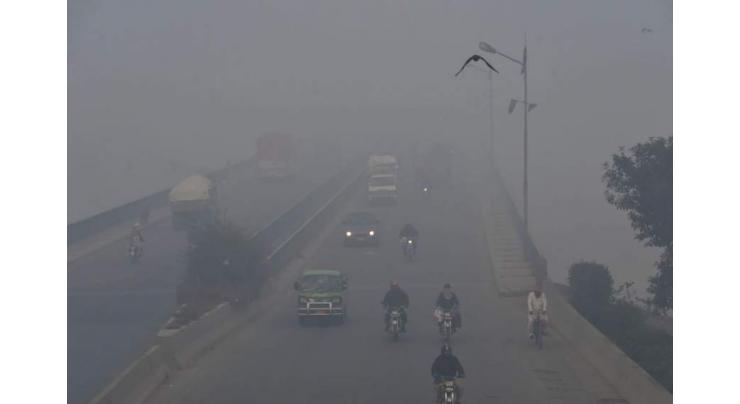
Smog Grips Pakistan With Increased Risk Of Respiratory Issues
Mohammad Ali (@ChaudhryMAli88) Published December 03, 2019 | 04:41 PM

Smog season is prevailing across the country with its varying intensity from city to city and area to area with increased number of patients visiting hospitals with serious respiratory issues, cold, cough and flu problems
ISLAMABAD, (UrduPoint / Pakistan Point News - 3rd Dec, 2019 ) :Smog season is prevailing across the country with its varying intensity from city to city and area to area with increased number of patients visiting hospitals with serious respiratory issues, cold, cough and flu problems.
Talking to APP, Environmental Scientist at Sustainable Development Policy Institute (SDPI) Dr Imran Khalid said smog was prevailing in every city of the country, which should be realized by the all the stakeholders and general public. "No doubt air pollution is a silent killer and it creeps into the human body with unimaginable impacts on the respiratory and nervous system. It should be noticed seriously that air quality in the Federal capital is not moderate or healthy due to decreased temperature and increased density of suspended particles including particulate matter of 2.5 microns," he said.
He said Karachi, Lahore, Peshawar, Islamabad, Faisalabad and other cities were in the spotlight due to data availability, however, the other cities either rural or urban all had polluted air, which also required air quality monitoring. The smog impact could be easily observed with the number of hospital visitors being observed in every district and city.
Dr Imran Khalid said it was need of the hour to sensitize and educate the masses about increasing risk of air pollution and smog. "We have to convince them especially the farmers to stop putting the crop stubble or residue at fire, avoid open household garbage burning and every one of the masses contributing to smog. At present, the situation is worst in Lahore, but it would gradually turn the entire city if the issue is being handled in a causal manner," he added.
According to Environmental Protection Department Punjab data the Air Quality Index (AQI) was 182 (Met Department) and 269 at Waga where the air quality was noted satisfactory and moderate respectively.
However, the citizens were advised to wear masks, glasses and stay hydrated to avoid serious respiratory and health complications.
An Environmental Protection Department of Punjab official told APP that other than the trans-boundary pollution from India there were certain pollution factors at the local level which required serious attention.
The stubble burning in the eastern Punjab of India was not that much in Pakistan as it had been only carried out in certain districts across the province, he said.
"In Rawalpindi division, there is no issue of crop stubble burning rather two major factors of pollution are stone crushing units and brick kilns. Faisalabad alone has 450 textile mills and various other industrial units operating that put pressure on the environment. Similarly, Sialkot with its huge number of tanneries and sports manufacturing units increased the hazardous emissions contributing to the overall smog impact in the region," he added.
He said open garbage burning after vehicular emissions and stubble burning was the major cause of smog in the province. "There is section 144 imposed in Rawalpindi district on the directives of the Punjab government on the burning of crop residue, solid municipal waste, and other plastic and leather items in the winter. But due to lack of surveillance and proper monitoring mechanism it is impossible to charge the true culprit if found burning garbage openly," the EPD official noted.
When contacted the spokesperson Pakistan Institute of Medical Sciences (PIMS) Dr Khawaja Waseem told APP that around 600-700 patients suffering with respiratory issues, bad throat, asthma and flu were visiting the hospital in the federal capital.
"The main reason for increased respiratory disease patients is weather, air pollution and less rain increasing dust in the air," he said.
/395
Related Topics
Recent Stories

Bugti assures transporters for addressing their problems

Deputy Prime Minister and Foreign Minister, Mohammad Ishaq Dar meets foreign min ..

3 drug peddlers arrested, hashish recovered

1496,990 children given polio drops in five days: DC

Six terrorists killed, hideout busted in N Waziristan IBO: ISPR

Pakistan, Qatar agree to further expand trade, investment ties

Sindh cabinet approves Rs177.5m to strengthen, mobilize various wings of police

Faisal Karim Kundi takes oath as new KP Governor

Azad Jammu and Kashmir Prime Minister Anwaar ul Haq Chaudhry seeks more vibrant ..

Tahaffuz Manzil Foster Home providing care & support to homeless children

PCB proposes April 7 -May 20 window; tweaks in rules for HBL PSL 2025

Field hospitals now operational across Punjab: Azma Bukhari
More Stories From Weather
-

Hot, dry weather predicted for Sindh
13 hours ago -

Rain-windstorm/thunderstorm likely at isolated places:PMD
2 days ago -

Intermittent rains, snow falls paralyze normal life in AJK
5 days ago -

Hot, dry weather forecast for Sindh
8 days ago -

Rain-windstorm/thunderstorm expected in most parts of country: PMD
9 days ago -

Partly cloudy weather with chances of scattered rain predicted
12 days ago
-

Rains' New spell expected from April 24 in KP
12 days ago -

Hot, dry weather forecast for Sindh
13 days ago -

Dry weather to prevail in most parts of country:PMD
15 days ago -

More rain expected in various areas of Balochistan during next 24 hours
16 days ago -

Rain lashes parts of federal capital on Thursday
16 days ago -

PMD predicts rain in country’s different parts
17 days ago











